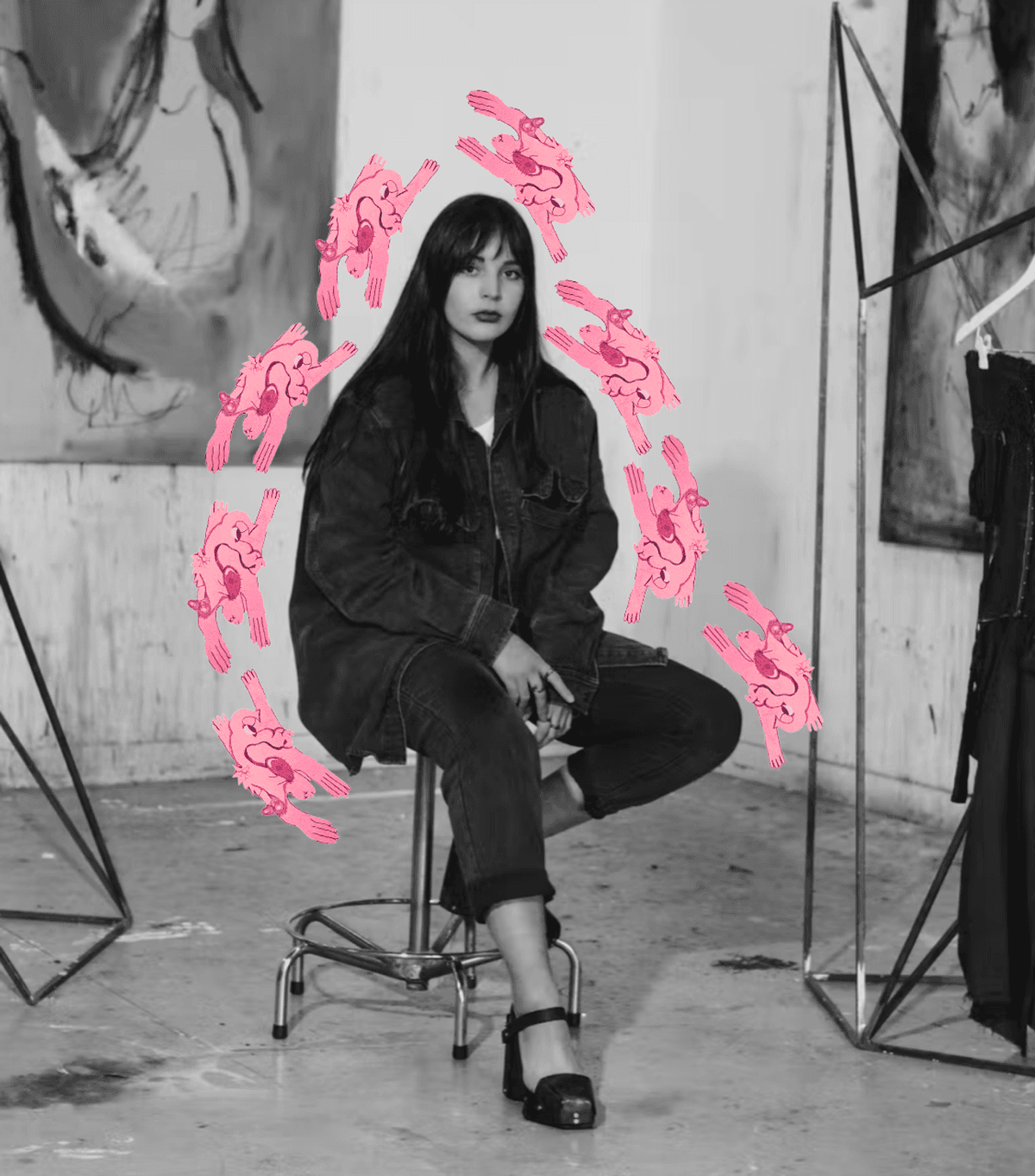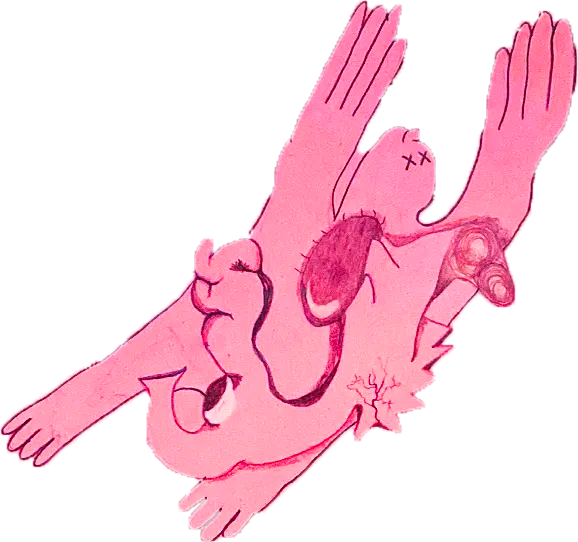PLOT IN THE ATTENTION ECONOMY
Elena Velez

I want to emphasize my belief in how much opportunity is squandered when only a certain demographic of society is able to contribute to the building of an image that is proposed to reflect us all.
RAFF PATEL: I've noticed that your collections are intensely visceral on both first sight and over time. What is your relationship to viscera? Do you consider yourself more fantastical or more of a realist?
ELENA VELEZ: I like to think of my work within the realm of the radically plain. Perhaps that could be interpreted as a combination of both...
PATEL: Who have been some of your key collaborators and inspirations? What does it feel like to work with them or be inspired by their work?
VELEZ: Growing up in the Midwest a lot of my friends and early collaborators were tradespeople – welders, machinists, fabricators, engineers. I think coming from an inherently blue collar social stratosphere informed a lot of the ways in which I consider the vision for the work and the value of the labor behind it. I'm really animated about a sort of punk potential for democratization in the American "high culture" space – where luxury can come from, geographically, socially, et al.
PATEL: You've highlighted the role of the Midwest as both a direct inspiration and as a counterpoint to coastal cities like LA and NYC within your work. With increased recognition, how has the importance and experience of place evolved for you?
VELEZ: I think this social and political interaction between the coasts and the Midwest has really been radicalized over the last few years. A lot of people my age, myself included, were really swept up in the liberal zeitgeist of these last few years only to be left feeling abandoned and spiritually exhausted. I'm fighting as hard as I can against nihilism but fashion is, at its core, a mirror to society, and to be authentic in the stories I tell through my work I have to be truthful to the spirit of my times. For me, this is navigating a burgeoning post-woke landscape as openly and honestly as I can.
PATEL: Many people I know fantasize about living elsewhere, wherever that might be. It's a state of mind, as they say. But I wonder if it's more temporal than physical. How do you work with nostalgia?
VELEZ: I don't identify with my times. I feel like I've missed all of the great cultural revolutions that I would have liked to contribute to. Nostalgia is one of the most crushing and devastating anticlimaxes of my life – I've lived pretty nomadically, searching for some semblance of tribe yet every time I get to a new place I feel like I'm arriving at a party that ended hours before. I can put myself into a depression mourning the unknown friends and lovers I've been separated from across time and space.
PATEL: What do you miss the most about the Midwest and Milwaukee when you're not there?
VELEZ: The things I miss about Milwaukee don't exist. They're just romanticisms.
PATEL: Is there anything specific that you've been thinking about femininity in the US right now? I'm wondering how you see it politically and aesthetically.
VELEZ: I'm a believer in Longhouse theory and feel like we've ended up centering a lot of sociopolitical, artistic, and academic foundations around hyper-feminine values to an unhealthy extreme. I'm constantly fatigued by the technocracy, weepy moralism, and victimology dominating the feminist initiative in the culture coasts right now. Growing up, the working class archetypes of womanhood that I had were ornery, assertive, capable, sincere, and culpable for their desires both good and bad. I'm raising my daughter in this truth and building my creative universe around these pillars.
PATEL: What do you think about mom culture on Instagram and social media in general?
VELEZ: I can't stand the tone of mommy culture on social media – I'd venture to guess that this is because there's a pretty specific profile for the types of mothers who have time to build culture on social media. Community is important but I've never found a motherhood forum online that wasn't embellished with sickly sweet platitudes, humblebraggery, infantilism, and subtle resentment.
PATEL: What's your favorite book?
VELEZ: I'm trying to get through Bronze Age Mindset right now.
PATEL: Outside of fashion, what kind of art would you say influences your work the most?
VELEZ: Most of my process is pretty literary – I conceptualize a new body of work in the same way I would write a persuasive essay with a thesis statement and supporting evidence... I'm inspired right now by the downtown alt literary scene... for the first time in a long time the idea of the speakeasy has new meaning and I'm really enjoying this new community of dissident public intellectuals, writers, critics, and podcasters.
PATEL: Coverage of your work has often underscored the financial expense of being a designer, something that is generally unspoken about in the fashion industry. What do you think can be done to make fashion more equitable?
VELEZ: I don't necessarily think the industry needs to be more equitable. I was never under the impression this shit would be fair. I just feel vindicated and emboldened by having others witness these hardships alongside me. I also want to emphasize my belief in how much opportunity is squandered when only a certain demographic of society is able to contribute to the building of an image that is proposed to reflect us all.
PATEL: If you were on the Supreme Court and you could help to pass one constitutional amendment, what would it be?
VELEZ: Universal healthcare would be tight.
PATEL: You’ve talked about the development of characters when creating a collection. What is your approach to world building?
VELEZ: I try to reflect the archetypes of the subcultures I'm drawing upon, both real and fictitious. They all have their own subplots and communities and embody the value system of the brand in different, sometimes paradoxical ways. Casting is really important to the communication of the collection. In seasons past we've constructed characters like the Lot Lizard, Agrarian Spiritualist, Forklift Certified, American Gothic, Belle Epoque Harlot... this Septembers taxonomy includes Substack Grifter, E-Girl, Bimbo Theorist, Femcel, Twitter Anon... etc.
PATEL: What do you think becomes possible when wearing a a garment? What are you enjoying wearing right now?
VELEZ: I'm not a particularly stylish person and my interest in fashion is purely craft-based. I'm working on bridging the divide but growing up poor makes you a pretty satisfied window shopper. I'm starting to lose my baby weight and trying to gauge the post-partum value of my currency in the sexual marketplace once again. My summer look is giving Lobotomized Greenpoint Stepford Wife: bike shorts, kitten heels, tank top, $8 oat latte, stroller.
PATEL: Narrative is unavoidable and, especially in the case of a highly commodified industry like fashion, advantageous. What's your relationship to your own personal narrative and that of your brand?
VELEZ: I'm hyper-aware of the power of narrative and I've always been really good at finding seamless ways to connect seemingly disparate ideas. I'm pretty Machiavellian in my exploitation of that skill set to build my own public persona. I'm playing a really long game – I realize the importance of plot in the attention economy, public peaks and valleys included.
PATEL: What’s something someone said to you recently that stuck with you?
VELEZ: "Like the ocean, Costco should be feared and respected."
← back to features
